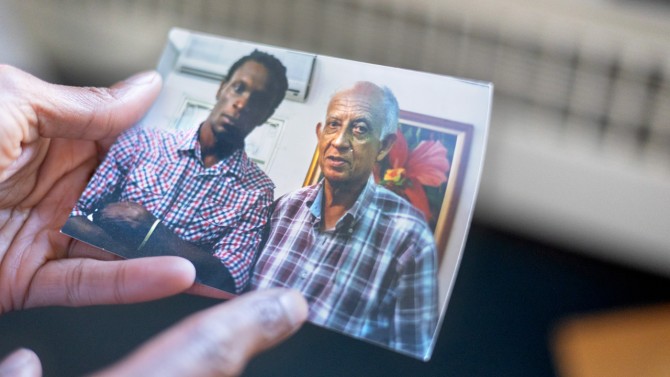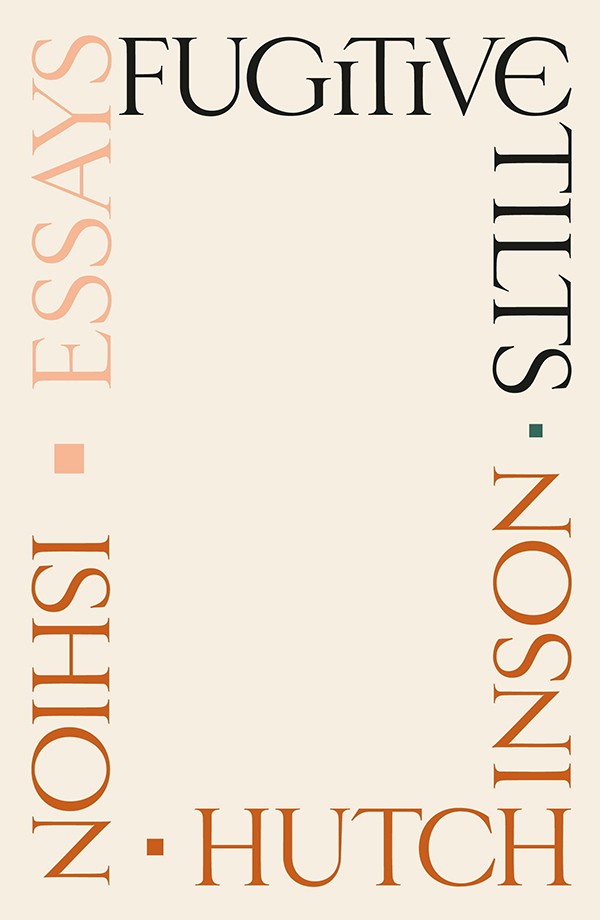In the pantheon of literary crimes - unoriginality, a tin ear, a heavy hand - Ishion Hutchinson admits to one of the most pardonable: "I write prose as a poet."
And for good reason. Hutchinson, the W.E.B. Du Bois Professor in the Humanities in the College of Arts and Sciences, has published three collections of poetry, including "House of Lords and Commons," which won the National Book Critics Circle Award for Poetry in 2017.
This month he is making his prose debut with his first essay collection, "Fugitive Tilts," published by Farrar, Straus and Giroux. The book collects two decades' worth of probing reflections on his childhood in Jamaica, the country's cultural and colonial history, his literary forebearers and his maturation as a writer.
Hutchinson is pictured with his former professor, the late Jamaican poet Edward Baugh, to whom "Fugitive Tilts" is dedicated.
Taking together, the essays present "a portrait of the young artist as a reader," he said.
"To a great extent it's about the education of an aesthetic sensibility, which is very much caught between all kinds of sociopolitical and historical structures that bear heavily on that reader hoping to become an artist or a writer or a poet, discovering what it means to become more confident," Hutchinson said.
That sense of discovery is an integral part of how he composed his essays.
"Writing prose, because I'm not such a seasoned practitioner, there's a learning curve for me as I am mapping its way," he said. "So I'm doing the learning of writing it as I am writing it."
Hutchinson grew up in the coastal town of Port Antonio, Jamaica. Port Antonio is an idea as much as a locale for him - one that he frequently revisits in "Fugitive Tilts."
"Even as a child, I already developed nostalgia for the place," Hutchinson said. "I heard people talking about a Port Antonio that wasn't necessarily the reality of the one that I grew up in. So already I was looking for that."
What he was searching for, he said, was the Port Antonio of his grandmother's generation, a period in the late 1950s and early '60s, just before the country achieved independence, in 1962. At that time, Jamaican culture and identity were coalescing around vibrant forms of live music, such as ska and dancehall, that were "infused with the horrors of history," and yet, because of their infectious rhythms, offered transcendence from such trauma.
Music, in turn, has infused much of Hutchinson's writing, as evidenced by his essays exploring the impact of dub legend Lee "Scratch" Perry and his love of saxophonist John Coltrane.
"It's a real gift to have grown up with that constantly in the background. So to be affirmed and reaffirmed again, that can't be taken for granted, and this is what this music does," he said. "It has this great quality of - not triumphalism at all - but making you recognize that you are of value and that your place here is important as anybody else's."
Hutchinson wrote his earliest essays as a student, and while he enjoyed composing them, he never felt he was very good at the form. The essays he wrote were not academic or scholarly. They lacked any sense of formal patterning. They leaned more towards the personal.
Now, it is that personal dimension that gives his essays so much of their power. But it was only after five years of collecting and culling the essays, and then rewriting and editing them, that Hutchinson began to understand the themes threading through the collection.
"In that process, there's a lot of coming to terms with the material and rediscovering or seeing anew things that I had forgotten about, like, 'Oh, I'm writing a lot of personal essays,'" he said. "It really has to touch a personal note, and that is what sort of dictates the shape that an essay might take. None of the essays necessarily follow the kind of traditional, formal demands of the essay. That's the way in which they are a poet's essays."
Most of the pieces in "Fugitive Tilts" began as commissions from publications such as Granta, Harper's Magazine, The New Yorker and The Paris Review. While Hutchinson may not have selected his subjects, he makes them uniquely his own via his natural facility with language, his deep knowledge and a canny sense of observation.
Travel is an essential theme of the book - and Hutchinson's life - with dispatches from Senegal and Toronto, memories of graduate school in New York City, all the way to his home office in Ithaca, where a poster of Coltrane lays, superstitiously, in the middle of the floor. The sea is never very far from Hutchinson's mind.
Nor are his literary predecessors. From his early obsession with Robert Louis Stevenson's "Treasure Island" to his parsing of the feud between Derek Walcott and V.S. Naipaul, Hutchinson honors his influences and always finds an original angle on their work. At the same time, he never glosses over their shortcomings. By digging so deeply into their art, his conception of the writers often changes.
"One of the motivations for writing about them in the first place is, does the great love and affection for their work and writing about them deepen that love and affection?" he said. "But it's interesting - and maybe this is a case of maturity, and maybe it's a case of artists always looking to kill their forebearers - you can see, too, where there are cracks in the monument. So the subject under observation becomes a lot more human."
Part of writing, for Hutchinson, is an attempt to appease one's ancestors as much as it is a way of earning some nod of acknowledgement in return.
"If I had to isolate this type of writing and give it a sort of poetry genre, it's more of an ode, an 'in praise of' the things that I love," he said. "A better way to put it is with Coltrane. You know, these essays are a grab bag of 'My Favorite Things.' They are really love songs to things that have sustained me and given me a lot to hope for."








